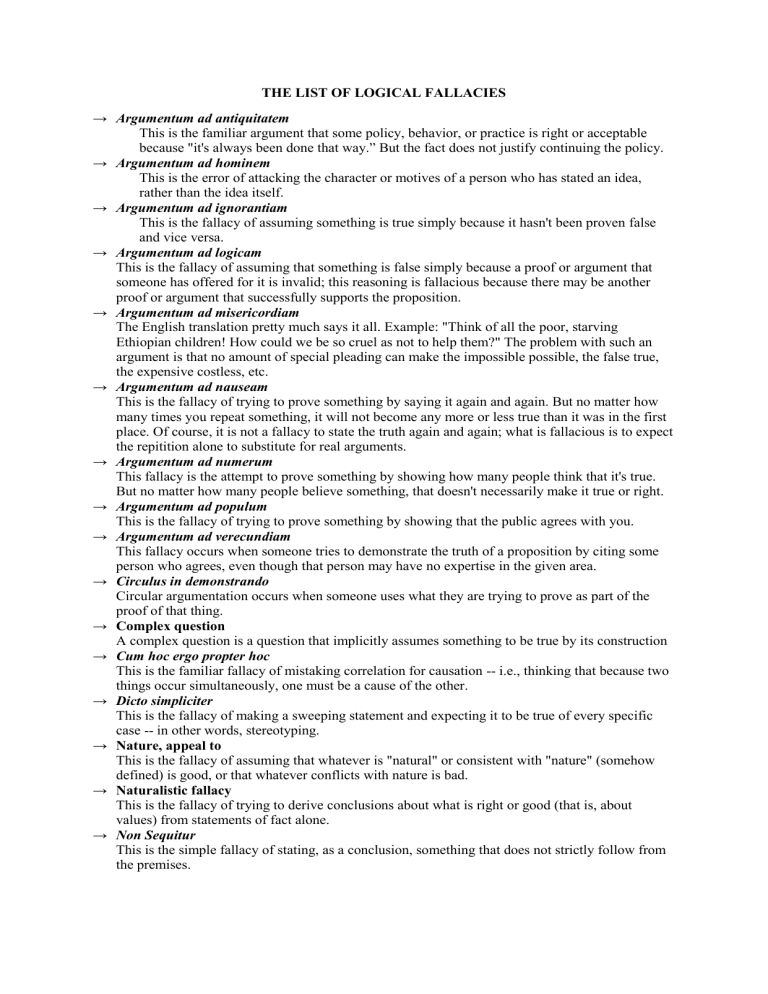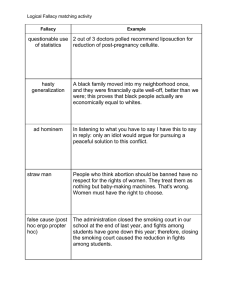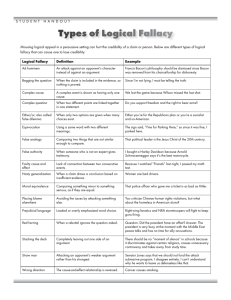
THE LIST OF LOGICAL FALLACIES → Argumentum ad antiquitatem This is the familiar argument that some policy, behavior, or practice is right or acceptable because "it's always been done that way.” But the fact does not justify continuing the policy. → Argumentum ad hominem This is the error of attacking the character or motives of a person who has stated an idea, rather than the idea itself. → Argumentum ad ignorantiam This is the fallacy of assuming something is true simply because it hasn't been proven false and vice versa. → Argumentum ad logicam This is the fallacy of assuming that something is false simply because a proof or argument that someone has offered for it is invalid; this reasoning is fallacious because there may be another proof or argument that successfully supports the proposition. → Argumentum ad misericordiam The English translation pretty much says it all. Example: "Think of all the poor, starving Ethiopian children! How could we be so cruel as not to help them?" The problem with such an argument is that no amount of special pleading can make the impossible possible, the false true, the expensive costless, etc. → Argumentum ad nauseam This is the fallacy of trying to prove something by saying it again and again. But no matter how many times you repeat something, it will not become any more or less true than it was in the first place. Of course, it is not a fallacy to state the truth again and again; what is fallacious is to expect the repitition alone to substitute for real arguments. → Argumentum ad numerum This fallacy is the attempt to prove something by showing how many people think that it's true. But no matter how many people believe something, that doesn't necessarily make it true or right. → Argumentum ad populum This is the fallacy of trying to prove something by showing that the public agrees with you. → Argumentum ad verecundiam This fallacy occurs when someone tries to demonstrate the truth of a proposition by citing some person who agrees, even though that person may have no expertise in the given area. → Circulus in demonstrando Circular argumentation occurs when someone uses what they are trying to prove as part of the proof of that thing. → Complex question A complex question is a question that implicitly assumes something to be true by its construction → Cum hoc ergo propter hoc This is the familiar fallacy of mistaking correlation for causation -- i.e., thinking that because two things occur simultaneously, one must be a cause of the other. → Dicto simpliciter This is the fallacy of making a sweeping statement and expecting it to be true of every specific case -- in other words, stereotyping. → Nature, appeal to This is the fallacy of assuming that whatever is "natural" or consistent with "nature" (somehow defined) is good, or that whatever conflicts with nature is bad. → Naturalistic fallacy This is the fallacy of trying to derive conclusions about what is right or good (that is, about values) from statements of fact alone. → Non Sequitur This is the simple fallacy of stating, as a conclusion, something that does not strictly follow from the premises. → Petitio principii This is the fallacy of assuming, when trying to prove something, what it is that you are trying prove. → Post hoc ergo propter hoc This is the fallacy of assuming that A caused B simply because A happened prior to B. A favorite example: "Most rapists read pornography when they were teenagers; obviously, pornography causes violence toward women." → Red herring This means exactly what you think it means: introducing irrelevant facts or arguments to distract from the question at hand. → Straw man This is the fallacy of refuting a caricatured or extreme version of somebody's argument, rather than the actual argument they've made. → Tu quoque This is the fallacy of defending an error in one's reasoning by pointing out that one's opponent has made the same error. An error is still an error, regardless of how many people make it. For example, "They accuse us of making unjustified assertions. But they asserted a lot of things, too!"



